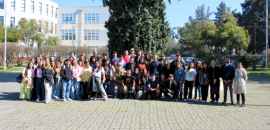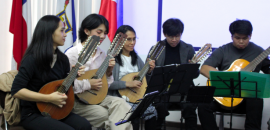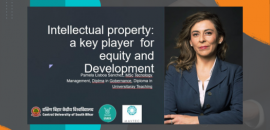- Español
- English
You are here
World Intellectual Property Day: USACH academic gave keynote presentation at AVINYA 2024
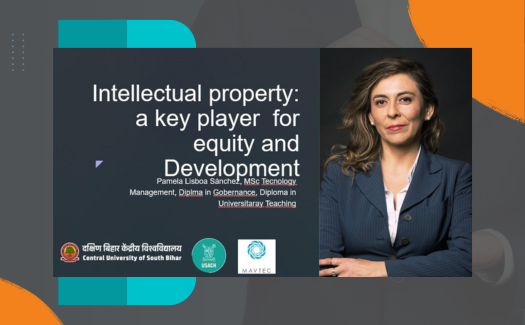
Pamela Lisboa, professor of the Faculty of Chemistry and Biology, was in charge of the keynote address at the conference, which sought to explore the fundamental role of Intellectual Property in the achievement of the Sustainable Development Goals.
The international conference AVINYA 2024, organized by the Central University of South Bihar (India) and held on the occasion of the International Intellectual Property (IP) Day, was held on April 26. The event was held in virtual mode and counted with the fundamental participation of Pamela Lisboa Sánchez, an academic from the Faculty of Chemistry and Biology of the Universidad de Santiago de Chile, who was in charge of the central presentation.
Professor Pamela Lisboa Sánchez is a biochemist, Master in Technology Management and teaches science, innovation, entrepreneurship, ethics, project management, among others. Her classes are present in different undergraduate and graduate programs of the Faculty of Chemistry and Biology and the Faculty of Administration and Economics. Her participation in AVINYA arose from his relationship with Professor Ashok Kumar of Central University of South Bihar, whom she met in a course organized by the World Intellectual Property Organization (WIPO).
“With Professor Ashok we are part of a group called 'Intellectual Property for Sustainability’ which we set up after the course. This is an international discussion and dissemination group, of which I am one of its managers,” said Pamela Lisboa Sánchez.
Thus, the USACH academic was invited to participate in the 2024 edition of AVINYA, whose theme was “Intellectual Property and the SDGs: Fostering a shared future through innovation and creativity”. The event was held in the format of keynote lectures by leading experts in intellectual property law and sustainable development, with the aim of creating a meeting point where academics, professionals, policy makers or stakeholders could meet.
“My presentation was entitled 'Intellectual Property as a key actor for equity and development' and I addressed issues such as the multidisciplinary nature of intellectual property and its three-dimensional character: technical, legal and commercial”, explained the professor of the Faculty of Chemistry and Biology, adding that ‘if we wanted to talk about a fourth element, it would be ethics’.
As a professor of ethics at USACH, Pamela Lisboa Sánchez and her students analyze various corruption issues and how they impact business. They also examine the effects of a new public policy framework and new governance for research, innovation and technology transfer.
Regarding the intersection between intellectual property and the SDGs, the professor commented that “there are Sustainable Development Goals that are closely related to IP, especially those that have to do with innovation. Technologies serve to take care of the environment. That is, we can orient them to be clean, to take care of water, to promote renewable energies, and also, of course, to highlight the role of women and equity from an intersectional point of view in authorship, in the development of new intellectual property assets, etc.”.
AVINYA 20204 had a wide international media coverage, but mainly in India, where the meeting appeared in several digital and written media, highlighting the presentation of the academic from the Universidad de Santiago de Chile.
Finally, when asked about the reality of the country in intellectual property matters, Professor Pamela Lisboa Sánchez pointed out that “Chile has advanced by leaps and bounds. There is a challenge that goes beyond intellectual property, which is to strengthen industrial systems, to reinforce innovation at company level, so that technology transfer processes are more adequate, at the level of a developed country”.
In this regard, she considers that “it is important to incorporate intellectual property concepts in all careers. And it is necessary to reinforce the knowledge of innovation and intellectual property at the level of basic and middle schools, technical training centers, universities and industrial associations”.
News
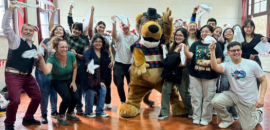 International students learn cueca with Usach Without Borders and Department of Cultures and Arts
International students learn cueca with Usach Without Borders and Department of Cultures and Arts
12 Sep 2024
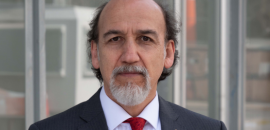 Rector Vidal to join the Governing Board of UNESCO's International Institute for Higher Education
Rector Vidal to join the Governing Board of UNESCO's International Institute for Higher Education
2 Sep 2024
 Students visited the Ambassador of Morocco to learn about the country's diplomatic work and culture
Students visited the Ambassador of Morocco to learn about the country's diplomatic work and culture
25 Jul 2024

